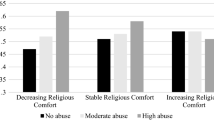Abstract
Adult members of 79 Albanian families who had fled from Kosovo to Macedonia during the immediate postwar period (June–August 1999) were interviewed. In conjunction with therapeutic intervention, the Harvard Trauma Questionnaire (HTQ) and the General Health Questionnaire (GTQ) were administered. Trauma symptoms as measured by the HTQ and psychological distress as measured by the GHQ were highly correlated. The best predictor of psychological distress was severity of the trauma experienced. Refugees with high educational attainment had fewer trauma symptoms than those with lower educational attainment. Refugees who lived with host families in towns showed fewer trauma symptoms than those who lived in camps, but they were also more highly educated. The results of hierarchical multiple regression analyses suggested that educational attainment may mediate the effect of place of residence. Educational attainment may be an indicator of resourceful and effective coping strategies that ameliorate the effects of trauma.
Similar content being viewed by others
REFERENCES
American Psychiatric Association (1999). Diagnostic and statistical manual of mental disorders (4th ed.). Washington, DC. Author.
Cardozo, B., Vergara, A., Agani, F., & Cotway, G. (2000). Mental health, social functioning, and attitudes of Kosovar Albanians following the war in Kosovo. Journal of the American Medical Association, 284, 569–577.
De Ridder, D. T. D. (1995). Social status and coping: An exploration of the mediating role of beliefs. Anxiety, Stress, & Coping: An International Journal, 8, 311–324.
Epstein, R. S., Fullerton, C. S., & Ursano, R. J. (1998). Posttraumatic stress disorder following an air disaster: A prospective study. American Journal of Psychiatry, 155, 934–938.
Goldberg, D. P. (1972). The detection of psychiatric illness by questionnaire. London: Oxford University Press.
Holmbeck, G. N. (1997). Toward terminological, conceptual, and statistical clarity in the study of mediators and moderators: Examples from the child-clinical and pediatric psychology literatures. Journal of Consulting and Clinical Psychology, 65, 599–610.
Leopold, M., & Harrell-Bond, B. (1994). An overview of the world refugee crisis. In A. J. Marsella, T. Bornemann, S. Ekblad, & J. Orley (Eds.), Amidst peril and pain: The mental health and well-being of the world's refugees (pp. 17–31). Washington, DC: American Psychological Association.
Mollica, R. F., Caspi-Yavin, Y., Bollini, P., Truong, T., Tor, S., & Lavelle, J. (1992). The Harvard Trauma Questionnaire: Validating a cross-cultural instrument for measuring torture, trauma, and posttraumatic stress disorder in Indochinese refugees. Journal of Nervous & Mental Disease, 180, 111–116.
Moreno, I. (2000). Kosovar Albanian children draw war. Peace Review, 12, 361–367.
Nieburg, P., Person-Karrell, B., & Toole, M. (1992). Malnutrition/mortality relationships amongst refugees. Journal of Refugee Studies, 5, 247–256.
Orley, J. (1994). Psychological disorders among refugees: Some clinical and epidemiological considerations. In A. J. Marsella, T. Bornemann, S. Ekblad, & J. Orley (Eds.), Amidst peril and pain: The mental health and well-being of the world's refugees (pp. 193–206). Washington, DC: American Psychological Association.
Shalev, A. Y., Peri, T., Canetti, L., & Schreiber, S. (1996). Predictors of PTSD in injured trauma survivors: A prospective study. American Journal of Psychiatry, 153, 219–225.
Weine, S., Becker, D., McClashan, T., Laub, D., Lazrove, S., Vojvoda, D., & Hyman, L. (1995). Psychiatric consequences of “ethnic cleansing”: Clinical assessment and trauma testimonies of newly resettled Bosnian refugees. American Journal of Psychiatry, 152, 536–542.
Weine, S., Vojvoda, D., Becker, D., McGlashan, T., Hodzic, E., Laub, D., Hyman, L., Sawyer, M., Lazrove, S. (1998). PTSD Symptoms in Bosnian refugees 1 Year after resettlement in the United States. American Journal of Psychiatry, 155, 562–564.
Winter, P. R. (2000). The Year in Review, Kosovo: Bombing in the name of humanity. World Refugee Survey 2000. US Committee for Refugees.
World Health Organization (2000). Health needs assessment in Kosovar refugees in host families in the former Yugoslav Republic of Macedonia. Humanitarian Assistance Project Office, Skopje, FYR Macedonia.
Author information
Authors and Affiliations
Rights and permissions
About this article
Cite this article
Moreno, I.T., Gibbons, J.L. Trauma Events, Residence in Refugee Camps, and Educational Attainment as Predictors of Trauma Symptoms of Albanian Refugees in Macedonia. International Journal of Group Tensions 31, 155–174 (2002). https://doi.org/10.1023/A:1015208700162
Issue Date:
DOI: https://doi.org/10.1023/A:1015208700162




